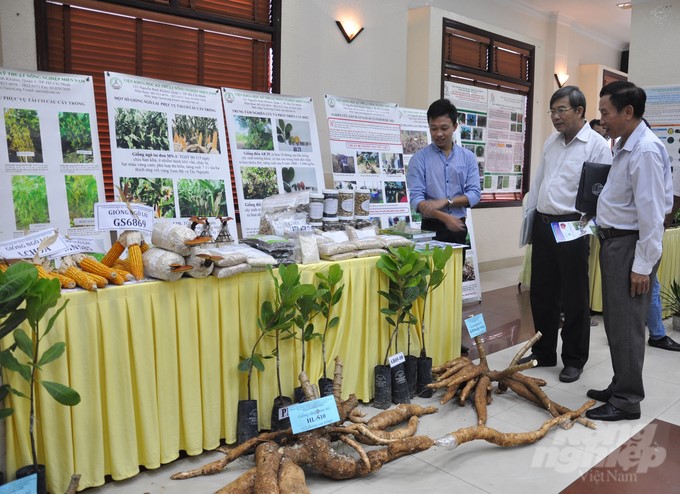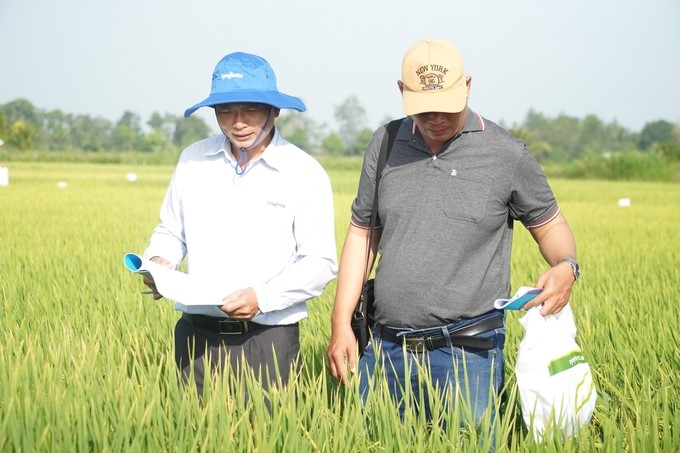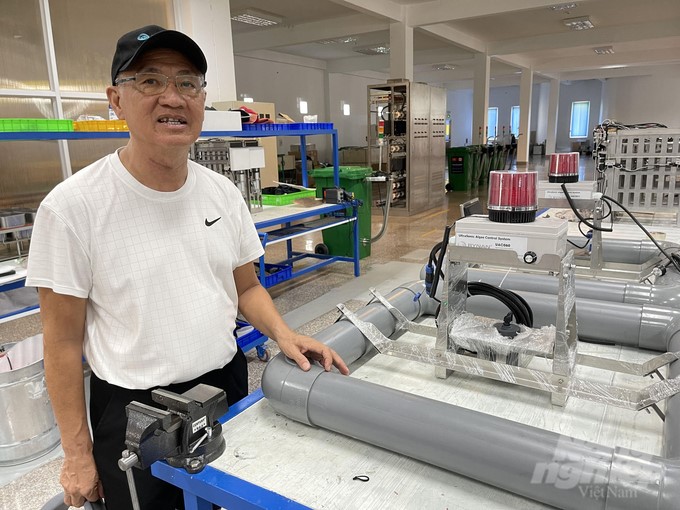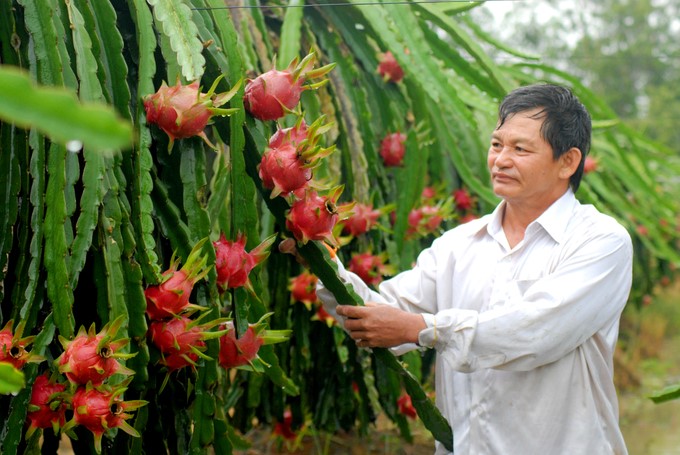June 18, 2025 | 02:41 GMT +7
June 18, 2025 | 02:41 GMT +7
Hotline: 0913.378.918
June 18, 2025 | 02:41 GMT +7
Hotline: 0913.378.918

Research and transfer activities of crop varieties by institutes and schools in the Mekong Delta are increasingly dynamic, with high applicability to production practice. Photo: Huu Duc.
The Mekong Delta region has more than 59,450 businesses in operation. Every year, the region has an average of 400 - 500 start-up projects, and 20 - 30% of these are start-up projects with creative elements and potential for development.
According to the Vietnam Chamber of Commerce and Industry, Can Tho City Branch (VCCI-Can Tho), after seven years of implementing the start-up contest, the Mekong Delta provinces have gathered more than 1,500 applications and 5,000 participants from universities and colleges. With start-up ideas derived from practice, such as climate change, agriculture, food processing, application technology, business-commerce-service solutions, tourism, industrial production, health service-health care, and education.
Along with efforts to implement guidelines, resolutions, policies, and action programs on Mekong Delta development within the framework of the Sustainable Development Program for the Mekong Delta with a vision to 2045, Can Tho University (CTU) signed a cooperation agreement with the National Innovation Center (NIC) under the Ministry of Planning and Investment and a cooperation agreement with VCCI-Can Tho and RYNAN Technologies Vietnam JSC last June. The signings aim to optimize the potential of the parties towards serving the community more effectively.
CTU is a university with the largest scale of training, teaching, and scientific research in the Mekong Delta region. In the activities of science and technology, innovation, and startup, CTU, with the achievement of 55 years of accompanying development with agriculture in the Mekong Delta, has made great contributions, notably in the field of crops and soil science, such as research on planthopper-resistant rice varieties, gardening economy, a collection of 3,000 rice varieties, improvement of alum, etc. Besides, in the field of animal husbandry and veterinary medicine, the school’s contributions include the Heifer program, breeding, nutrition, treatment of cattle and poultry diseases, etc.

Many high-quality rice varieties from institutes, schools, and enterprises have been put into production and widely developed in the Mekong Delta provinces. Photo: MD.
In the field of fisheries, the CTU’s Faculty of Fisheries has researched, transferred, and put into production Artemia, pangasius varieties, giant tiger prawn varieties, giant freshwater prawn varieties, and imported and indigenous species. In the field of food processing and technology, the school’s activities include the preservation of seafood and fruits, the synthesis of natural compounds, and the reuse of by-products. In the field of agricultural technology, the school gained achievements in agricultural mechanization and automation; land and water environmental monitoring; automation in farming, product processing, logistics, etc.
In the 2018 - 2020 period, CTU’s scientific research activities at all levels have over 2,000 topics and projects at all levels, with a total budget of over VND 311 billion. The school has carried out technology transfer to farmers, businesses, and local managers and technicians through forms at school, farms, and localities. Currently, CTU is developing 80 technological processes, ready to be transferred to Mekong Delta provinces and cities.
According to the Can Tho Department of Science and Technology, the state management work of science and technology is increasingly focused on all fields, from scientific research to standards, measurement, quality, technology, intellectual property, statistical information, etc. Thereby, contributing to improving management efficiency and effectiveness.
In fact, in recent years, Can Tho City has shown quite clearly its coordination and linkage in organizing science, technology, and innovation activities in the region, especially the linkage, information sharing, and coordination in implementing scientific and technological tasks, with the most prominent and regular event being the Startup and Innovation Festival in the Mekong Delta (Techfest Mekong).

Many achievements in scientific and technological research and innovation in agriculture in the Mekong Delta have timely met the requirements of production. Photo: Minh Dam.
According to Dr. Ngo Anh Tin, Director of the Can Tho Department of Science and Technology, scientific research and technology development activities deployed are increasingly close to the application requirements, especially the proposal to order research tasks, quality improvement, and paying more attention to the applicability of research results to practice after acceptance.
The work of approval, appraisal, inspection, acceptance, and registration of results is carried out in accordance with regulations and attracts a team of experts from institutes and schools in the provinces and in the Mekong Delta region to actively advise. In addition, support activities in science, technology, and innovation will continue to be promoted to support organizations, individuals, and businesses in applying, transferring, and innovating technology, improving technological capacity, improving productivity and quality of products and goods, establishing and developing intellectual property, and promoting innovation.
In Tra Vinh province, a vivid example of scientific and technological research, innovation, and successful startups is the case of Dr. Nguyen Thanh My, a founder of RYNAN Technologies Vietnam JSC and a co-founder of eight high-tech enterprises. He is the inventor and co-inventor of over 150 patents in the United States, Canada, and dozens of countries nationwide.
In recent years, he has had many new inventions registered for patents, focusing on applying high technology to agriculture, such as producing smart fertilizers and agricultural equipment, and manufacturing IoT devices such as locks, water meters, water monitoring stations, smart insect monitoring systems, etc.

Dr. Nguyen Thanh My and research on high-tech shrimp farming equipment. Photo: Huu Duc.
Recently, Dr. Nguyen Thanh My shared about the application of the Oxygen Shrimp Model, a model of super-intensive, oxygen-rich shrimp farming where all processes are automated and optimized. Farmed shrimp products ensure quality and meet the strictest standards of import markets in the world.
Dr. My pays special attention to the value of intellectual property in new inventions and patent registration. Because patent protection will be the exclusive right to sell products and the tool to negotiate with partners and increase start-up value when calling for capital.
According to NIC, Vietnam’s global innovation index (GII) in 2021 ranked 44th out of 132 and led the group of 29 countries and economies with the same income level. In 2022, Vietnam ranked 48th out of 132 countries and economies, and Vietnam is recognized in the group of countries that have achieved the greatest progress over the past decade (up more than 20 places).

Many varieties of fruit trees, with high quality and yield and meeting the needs of consumption and export, have been put into production. Photo: HD.
However, the rate of spending on research and development activities of enterprises is still low, mainly investing in technology associated with goods, machinery, and equipment, with little investment in research and development. Over 80% of enterprises have not cooperated with units and organizations to carry out innovation activities, facing difficulties in improving capacity, accessing resources, and organizing research and development activities. Currently, the rate of spending on innovation, science, and technology in Vietnam is still low (approximately 0.44% of GDP).
According to NIC, innovation in agriculture aims to encourage large enterprises to invest in technology, focusing on investing in hi-tech agricultural zones and large-scale projects; developing new business techniques for small and medium enterprises; mastering important technological combinations in breeding; applying biotechnology, information and communication technology, and automation technology to build smart, safe, circular, efficient, and sustainable agriculture to take advantage of tropical agriculture.
Translated by Huyen Vu Thu

(VAN) According to the Binh Thuan Department of Industry and Trade, in the first five months of 2025, Binh Thuan's dragon fruit export turnover increased by 20.65% compared to the same period last year.

(VAN) EU countries on Thursday gave final approval to new tariffs on fertilizer imports from Russia, a move aimed at cutting off revenue that could support Moscow’s war in Ukraine, despite concerns from European farmers.

(VAN) The working delegation from the Ministry of Agriculture and Environment conducted an important trip to the Netherlands to strengthen strategic partnerships and sustainable development in the agricultural sector.

(VAN) The letter ‘A Plea from the Ocean’ not only evokes emotion but also awakens the human conscience to the responsibility of protecting life on Earth.

(VAN) The Department of Agriculture in South Africa has announced the country’s first mass vaccination of poultry to prevent local birds from contracting avian influenza.

(VAN) Establishment of the Mekong Delta Regional Agricultural Linkage Center, aiming for a closed value chain, deep processing, trading platforms, and international market connectivity.

(VAN) Gia Lai province has recently recorded 460 rare species of animals and plants, contributing to forest conservation and biodiversity planning in the region.